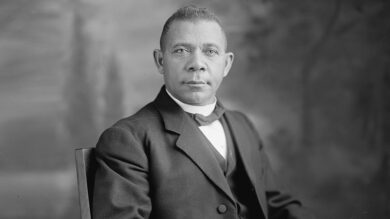Booker T. Washington’s philosophy, grounded in vocational training and economic self-reliance, extends beyond simple pragmatism. The Booker T. Washington philosophy highlights the need for building Black infrastructure—economic, educational, and social—to uplift Black communities and ensure long-term success.
The Intellectual Depth of Washington’s Philosophy

Booker T. Washington’s philosophy, with its emphasis on trades and practical skills, has sometimes been viewed as lacking the focus on intellectual pursuits championed by W.E.B. Du Bois. However, in reality, Washington’s approach was deeply intellectual, rooted in the belief that education should empower individuals and strengthen communities. For instance, while he prioritized the acquisition of trades for economic independence, he also supported higher education to prepare individuals for leadership roles within the Black community.
At the same time, at the Tuskegee Institute, Washington created an environment where students learned practical skills alongside academic subjects. This dual approach aimed to develop individuals who could achieve economic success while becoming educators, business owners, and community leaders. Ultimately, his strategy went beyond mere survival—it sought to cultivate a generation capable of leading Black communities toward self-reliance and resilience in the face of systemic racism.
Washington vs. Du Bois: A Clash of Philosophies

The debate between Booker T. Washington and W.E.B. Du Bois often portrays Washington as overly accommodating to systemic racism and Du Bois as a champion of immediate civil rights. However, this oversimplification fails to acknowledge Washington’s intellectual and strategic foresight, akin to a masterful game of chess, in building a strong and sustainable Black infrastructure. For example, while Du Bois’s “Talented Tenth” approach focused on cultivating an elite class of Black intellectuals, it unintentionally fostered classism that alienated much of the Black population.
On the other hand, Washington’s philosophy emphasized uplifting the broader Black community through practical skills and self-sufficiency. Moreover, his vision extended beyond vocational training to include higher education, creating well-rounded leaders and community pillars. In recognizing this balance, the Booker T. Washington philosophy prioritized self-reliance and the empowerment of the entire Black community over an exclusive intellectual elite.
Building Black Infrastructure

Washington’s efforts to establish the foundation for Black infrastructure stand among his most significant achievements. For instance, in 1900, he founded the National Negro Business League (NNBL), a platform supporting Black-owned businesses and acting as an early precursor to a venture capital firm. Through this organization, the NNBL provided resources, funding, and mentorship, fostering economic independence and empowering Black communities to build sustainable ecosystems.
Furthermore, Washington’s foresight in economic development was evident when he coined the term “Black Wall Street,” showcasing his branding skills and inspiring a vision of Black prosperity. As a result, by advocating for self-sufficient Black communities, he laid the groundwork for thriving Black business networks, including Tulsa’s. Even today, modern initiatives supporting Black businesses continue to reflect the enduring influence of the Booker T. Washington philosophy of infrastructure and community-driven growth.
Relevance in Modern Thought

The Booker T. Washington philosophy remains profoundly relevant today. Its focus on economic empowerment, education, and cultural preservation aligns with contemporary movements:
- Economic Empowerment: Supporting Black-owned businesses reflects Washington’s NNBL initiatives, highlighting the ongoing need for mentorship, resources, and access to venture capital.
- Education and Leadership: STEM education and entrepreneurship programs in underserved communities reflect Washington’s vision of leadership through practical education. At Tuskegee, his focus on agriculture, engineering, and science laid the groundwork for African American advancements in STEM, a legacy that continues to inspire modern initiatives.
- Cultural Preservation: Building self-sufficient Black communities highlights the importance of preserving Black culture and amplifying its influence.
Conclusion: The Need for Black Infrastructure
Booker T. Washington’s philosophy extended beyond existential survival; it was a comprehensive strategy to build and sustain Black infrastructure. His efforts to foster business ecosystems, promote education, and uplift all Black people rather than an elite class highlight his intellectual vision, compassion, and strategic acumen.
Today, Washington’s ideas serve as a blueprint for addressing systemic challenges through dedication, visionary thinking, and strategic innovation. By integrating his philosophy into modern initiatives, we can refocus on building resilient Black infrastructure that empowers and uplifts the Black community for generations to come.






